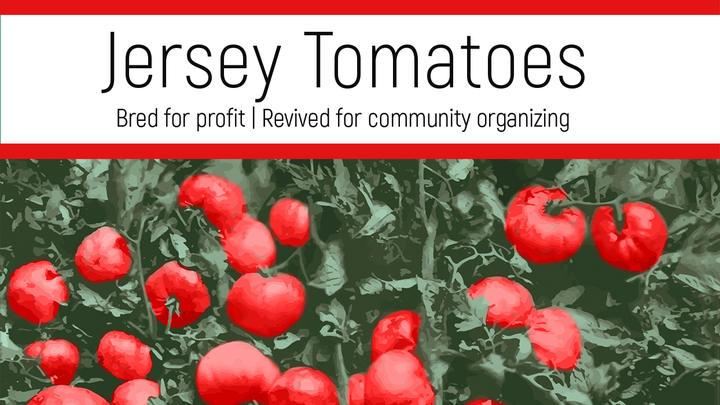
Jersey Tomato Call to Action Book & Media Project
Donation protected
Hi, my name is Jeff Quattrone, and I'm a New Jersey seed historian, heirloom seed activist and artist who has changed the open and free access to seeds dynamic across New Jersey. I launched my Library Seed Bank (LSB) project in 2014. I brought the seed library concept to Southern NJ where I live, and since then, I've consulted with librarians, citizens and business owners across NJ on setting up seed libraries. I've also consulted with people across the USA and set up a seed library in Calabria, Italy, where my paternal grandparents are from and where I'm registered as a citizen.
I've written a book. It's about the Jersey tomato being the intersection of Jersey culture, Jersey tomato seed breeding, and local seed and food history. It's written from a seed and food sovereignty point of view. It includes a call to action in the last chapter.
That call to action is open to the public in this GoFundMe campaign. I want to self-publish this book, and, with your support, that will happen.
Backstory
When I started my LSB project, my stretch goal was to find one "lost Jersey tomato" and bring it back home. I've revived three functionally extinct Jersey tomatoes so far, and in 2022, I have a community partner growing three more.
New Jersey has a remarkable seed and tomato breeding history. Jersey tomatoes are part of local culture. If you know, you know. They're also part of the national culture since Jersey tomatoes were in the can when Warhol created his iconic soup can series. Jersey tomatoes, in large part, built Campbell's Soup. They bet big and early on agricultural research, including a tomato breeding program. Tomato soup and grilled cheese are iconic American comfort food. Once again, Jersey tomatoes played a role since they were in Campbell Tomato Soup cans that played a large part in creating this iconic comfort food combination.
Modern Farmer published this feature I wrote in January 2022. It's about Campbell Soup's tomato breeding program and its impact on the Jersey tomato. It went viral, was reprinted by The Smithsonian Magazine, and into the Newsroom archive of Rutger’s University's New Jersey Agricultural Experiment Station. Michale Pollan also tweeted it. The research in this feature is mainly taken from my manuscript. This is the quality of research I have. It stands on the merits that were attributed to it by this article. Also, some of the research for this book was done at Smithsonian Gardens.
Breed for Profit, Revived for Community Organizing
Between the ketchup industry and the canning and soup industry that was here, tomatoes were bred that thrived with disease resistance in our soil, that were prolific and tasted good. A huge harvest was needed to sustain and grow the industries.
That all died off, and Campbell's farming and food production left in the late 20th century. However, their corporate headquarters is still here. Only one tomato-only packing plant exists here in Williamstown, NJ, and it's now corporation-owned after a long and distinguished local ownership history.
Looking at the impressive quality of these profit-bred tomatoes, which are now functionally extinct since the industries they were bred for don't exist here, I'm now reviving them with community partners for organizing around seed and food sovereignty.
Seeds and pulp
There's pulp left over when fruits and vegetables are processed for seed. But, here in Jersey, and likely in other places, when seed and food sovereignty was everyday life and not actions needed to secure seed and food rights, seed and canning companies were under one roof.
That concept is what this call to action is about. So this is how it will work; I will provide Garden State tomato seeds to people who request them through the Request Form.
With the provided seeds, folks can grow the plants, save the seeds and distribute them freely. Then, they process the leftover pulp to feed themselves, or if there are local organizations that cook and distribute meals in their community, donate the pulp to them.
How the money will be used
Some of the money will go towards living expenses for me while I finish this manuscript and organize the next steps.
I need to hire an editor to edit the book.
Funds to purchase the Garden State tomatoes at market value from the nonprofit growing them.
Postage and seed envelopes for distributing the seeds.
Costs associated with self-publishing.
Unexpected expenses and opportunities that funds will be needed for.
I had a tentative deal with a local NJ company for a community plan that will be similar to this call to action. That’s how I was going to end the book. Unfortunately, they didn’t want to pay me for the use of my research or the labor that would be involved in administering a community program.
That changed my plan of finishing the manuscript, finding an agent and selling the book in a traditional route.
Other media opportunities could come out of this project. For example, a social media campaign in 2023, a video project of the call to action in action, and I have an opportunity for a local radio show.
Your support will help this project become a public project for social change, document it, and share the success and failures we can learn from.
I have the content. The public is invited to organize around seed and food sovereignty, and there are multiple communication channels to tell this story that takes a profit motive in the form of breeding a beloved and iconic vegetable and flips it into a tool for community organizing.
With your support, this will happen.
Organizer
Jeff Quattrone
Organizer
Woodstown, NJ